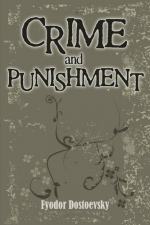|
This section contains 1,215 words (approx. 5 pages at 300 words per page) |

|
Better Now Than Later: a Response to Crime and Punishment
Summary: A critique of Fyodor Dostevsky's Crime and Punishment mainly focuses on the theme of guilt, and how that ends up overpowering Raskolnikov. Raskolnikov believed he had the best of intentions at the beginning, but as most extreme plans go, it turned into complete chaos.
There is an extraordinary aspect in Fyodor Dostevsky's Crime and Punishment that mirrors something my mother used to say to me as a child: "It's better if you tell me now rather than later." Of course, most times she said it was when I had done something bad, and she knew it, but wanted me to tell her myself. I believe that saying applies to this novel as well, albeit to a more serious degree. After the main character, Rasklonikov Romanovich, commits a horrible crime, the book really begins. Instead of a "murder novel" which has the revelation of the crime at the end, most of the events in the novel surround the different mental and psychological self-controversies that affect the killer after the crime.
Raskolnikov spends the majority of the novel trying to figure out how to get away with the murder of Alyona Ivanovna and her...
|
This section contains 1,215 words (approx. 5 pages at 300 words per page) |

|


